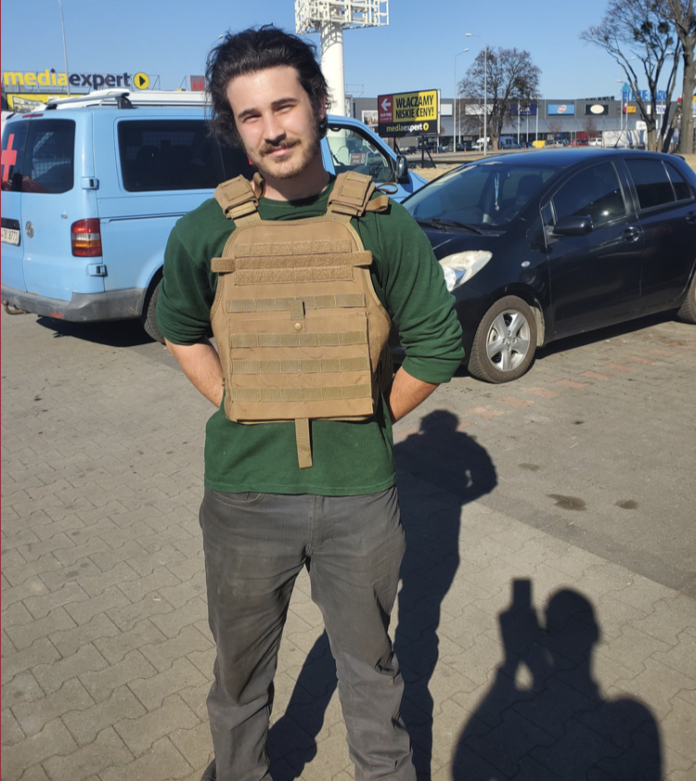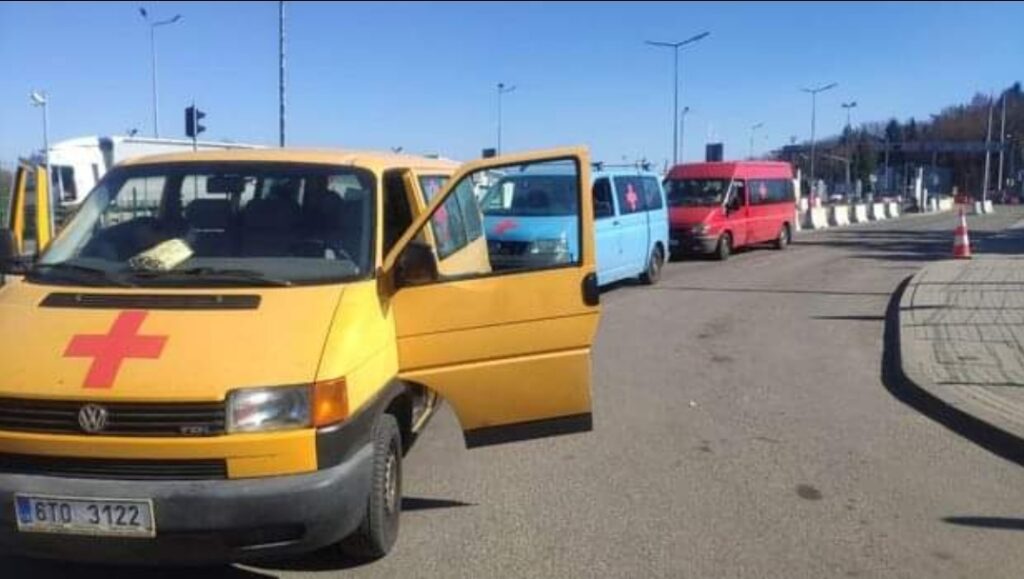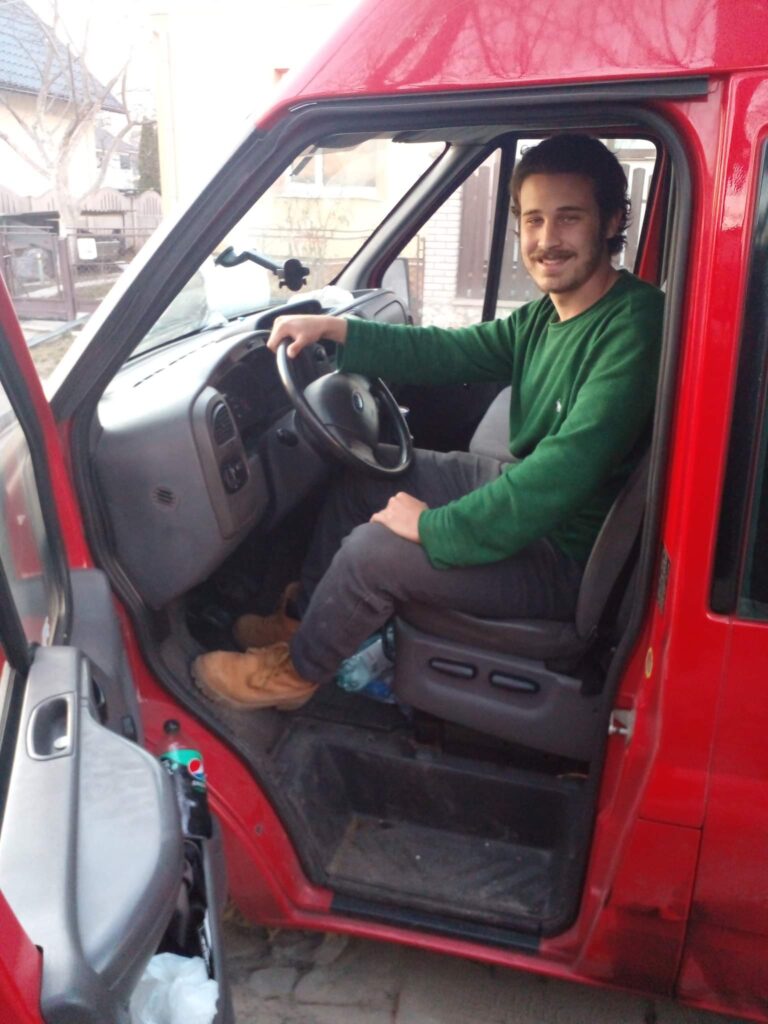
Salvatore Ambrosino | May 2
Southern Editor
To donate to Andy Roman’s non-profit, you can at ukrainianpeace.org
In Ternopil, a city west of Kyiv, Andy Roman, ‘21, helps refugees board a van with redcrosses painted on the side.
The vehicle held women, children and some elderly. One of the women in the van said her husband was killed, and her home was destroyed by the constant bombings in Irpin. Another shared he was “the last one alive in his family.”
Roman’s van is one of three driving groups of people over three hours away. They are being driven to Krakovets, a Ukrainian city bordering Poland.
“Long days, probably like 13 hours of driving every day,” Roman said.
Each time he returns to the city, his van is filled with the supplies that have bottlenecked in Poland—canned foods, antibiotics, insulin and other life-saving materials. The donations have been crucial to the survival of those who remain in Ukraine, but there are few drivers willing to bring the supplies into the country amid the Russia’s bombs, seemingly indiscriminate of citizen casualties. Thousands are dead and more are without homes.
“While I was over there I saw what they needed most,” Roman said. “There was an abundance of supplies at the Polish border but that was a bottleneck and there weren’t enough transportation or drivers to bring them into Ukraine.”
Roman’s family is Ukrainian. They live in Kyiv and a southwestern city called Chernivtsi. He had visited the country many times before Russia’s invasion turned its neighborhoods in the east into war zones. When the war began, he worried immensely and knew that he had to meet with his cousins as soon as possible.
“I was worried about my family over there,” Roman said. “I really couldn’t just share links on Facebook.”
Three weeks into the war he arrived in Europe, ready to return to the United States with his cousins. But when his cousins were drafted to fight off the Russian invaders, the family decided to stay in the country. Roman, despite having planned to leave through Romania, stayed in the country with them.
“They’re stubborn,” Roman said, half-joking.
Roman’s cousins are fighting somewhere in the country, though their locations are currently unknown to him. All he is permitted to know is that they’re not on the front lines.
While stuck in the Czech Republic, Roman was looking for ways to help. He says a stranger from a Ukrainian church group handed him the keys to a van that has since driven hundreds of women and children west of the Polish border. It has also brought thousands of critical supplies into Ukraine.
“I met up with them, complete strangers. By the grace of God,” Roman said. “They handed me the keys to a van and said ‘take this to Ukraine.’”
Roman says the roads in western Ukraine are rough.
“The drivers are crazy. People will split lanes and pass you with oncoming traffic. You just have to move over for them,” Roman said.
His van is painted with big red crosses. If late at night, Polish border patrol would remove him to inspect the vehicle. At this point, Roman says it’s much harder getting people into Poland than it is getting supplies into Ukraine.
“What’re you going to bring to Ukraine that it doesn’t already have,” Roman said.
There is currently no Russian military positioned in western Ukraine, where Roman and his fellow volunteers drive. He isn’t afraid of being shot at, he says. But the threat of bombings loom over all Ukraine.
“They’re bombing the whole country,” Roman said. “No where in the country is safe. Putin’s a madman—he’ll bomb a city if it hasn’t been bombed before.”
“It’s a roll of the dice,” Roman said. “It’s like getting hit by lightning—maybe a little bit more likely.”
Churches have networked throughout Ukraine to distribute supplies. When he returns to Ternopil from a day of driving, he sleeps side-by-side with other volunteers and refugees in the sanctuaries of these churches. Where the City Church of Ostrava has relocated was once the lobby of an apartment complex.
After over a week of driving a van at 80 miles per hour, singing “Eastbound and Down” from Smokey and the Bandit, avoiding near bombings, sleeping in churches and meeting people he’d likely never meet again, he would leave Ukraine. Shortly after his departure, Ternopil, the city in which he regularly took shelter, was bombed.

Roman has been home for three weeks. Upon returning home, he worked with his mother to create a non-profit, “UkrainianPeace.org,” to help buy more vehicles to transport supplies from the Polish border. Posters with a QR code have appeared around Florida Southern’s campus. They’ve raised enough to buy one vehicle for $8,000 and on Monday, May 2, when he returns to the country, they will be buying a second to “move supplies,” and “move people.”
But while at home, Roman says he feels guilty.
“When I first got home I felt really guilty,” Roman said. “I think about my cousins, who are younger than me, who live there every day.”
When he returns to Ukraine on May 2, it will be for three weeks, “depending on what happens,” he says.
On arrival, he will be transporting 180 bulletproof vests donated by the Martin County Sheriff’s Office into Kyiv, the closest to the front lines he has been so far.
“I’ve got a long way to go and a short time to get there, to do what they say can’t be done,” Roman said, quoting “Eastbound and Down.”

Before the war, Roman planned on finishing his MBA at Florida Southern.
The Southern will continue to report on Roman’s effort in Ukraine. For updates, follow us on Instagram and Twitter.







